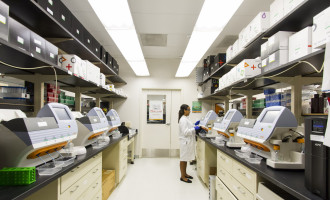
In a landmark study published in Current Molecular Pharmacology, a team led by Dr. Zhen Zhang from Central South University has identified six pivotal signalling pathways driving osteosarcoma progression.
The research, which synthesises preclinical and clinical data, offers a roadmap for developing precision therapies against OS, a malignancy notorious for its resistance to conventional treatments.
"Osteosarcoma remains a clinical challenge due to its aggressive nature and limited therapeutic options," explained Dr. Zhang.
"Our work pinpoints actionable targets across six pathways, providing a framework for next-generation treatments." The study highlights the CCNE1/CDK2 axis, where inhibitors like seliciclib and dinaciclib have shown efficacy in disrupting tumour proliferation.
Similarly, targeting MYC/CDK9 with BET inhibitors such as JQ1 and GSK343 has demonstrated potent anti-tumour effects in preclinical models.
The CDK4/CDK6/FOXM1 pathway emerged as another critical target, with FDA-approved inhibitors like palbociclib showing promise in clinical trials.
"Combining these inhibitors with traditional chemotherapy could overcome resistance," noted co-author Dr. Quanlei Ren.
The PI3K/AKT/mTOR pathway, frequently dysregulated in OS, was also highlighted, with natural compounds like piceatannol and baicalin exhibiting synergistic effects with standard therapies.
For metastatic OS, the study spotlighted AURKB and VEGFA/VEGFR pathways.
AURKB inhibitors like alisertib induced apoptosis, while anti-angiogenic drugs such as lenvatinib disrupted tumour blood supply.
"Targeting these pathways simultaneously could curb both primary growth and metastasis," added Dr. Xiaoxuan Zhao.
Source: FAR Publishing Limited
The World Cancer Declaration recognises that to make major reductions in premature deaths, innovative education and training opportunities for healthcare workers in all disciplines of cancer control need to improve significantly.
ecancer plays a critical part in improving access to education for medical professionals.
Every day we help doctors, nurses, patients and their advocates to further their knowledge and improve the quality of care. Please make a donation to support our ongoing work.
Thank you for your support.